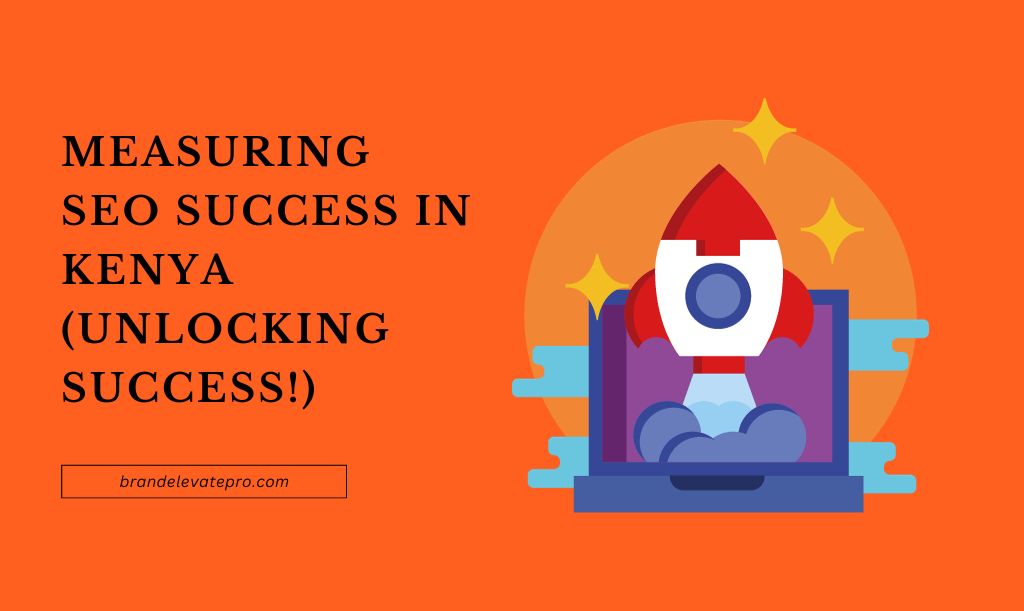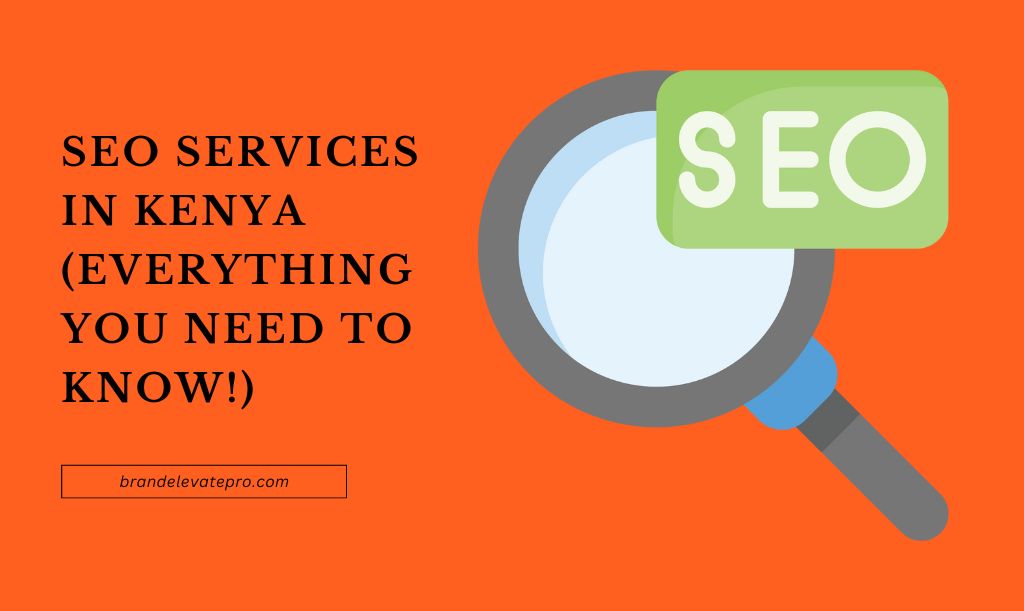Every business, whether big or small, dreams of achieving online dominance.
In this age of rapidly advancing technology and ever-increasing competition, having a robust online presence has become paramount.
Gone are the days when customers would flip through bulky directories and scroll through phonebooks; today, they simply turn to search engines like Google or Bing.
So Why Is Seo So Important?

The answer lies in understanding how search engines operate.
When users type a query into a search engine’s bar, they expect instantaneous and relevant results.
Search engine algorithms work tirelessly behind the scenes to deliver these results, sorting through millions upon millions of websites in mere fractions of a second.
This is where SEO swoops in like a digital superhero; it helps businesses optimize their websites so that they appear higher on SERPs for relevant searches.
By implementing effective SEO strategies tailored to Kenya’s unique market dynamics, businesses can attract more organic traffic and increase their chances of converting casual visitors into loyal customers.
Survival in an Online Jungle
In today’s cutthroat business environment, failing to prioritize SEO can be detrimental.
Think about it – if your website ranks low on SERPs while your competitors’ soar high above yours, potential customers will likely gravitate towards your rivals without even giving you a second glance.
In Kenya, where the digital landscape is flourishing, SEO becomes all the more crucial for businesses striving to stand out from the crowd.
Whether you’re a budding entrepreneur or an established enterprise, understanding and harnessing the power of SEO in Kenya can be a game-changer.
So buckle up and prepare to embark on an exhilarating journey into the world of measuring SEO success!
Key Metrics for Measuring SEO Success
When it comes to measuring SEO success in Kenya, organic search traffic is a vital metric.
It refers to the number of visitors who land on your website through unpaid, natural search results.
This means that users found your website by searching for relevant keywords or phrases on search engines like Google or Bing.
Organic search traffic is significant because it indicates the visibility and reach of your website in the online landscape.
The higher the number of organic search traffic, the more potential customers you can attract to your site.
Tracking organic search traffic in Kenya is crucial for businesses seeking to gauge their SEO performance accurately.
Several tools can help you monitor this metric effectively.
Google Analytics, one of the most popular tools, provides comprehensive insights into the amount and quality of organic search traffic you receive.
Additionally, tools like SEMrush and Moz offer keyword tracking features specifically designed for monitoring organic traffic trends in Kenya.
Keyword Rankings: Understanding Their Role In Seo Success
Keyword rankings play a crucial role in determining SEO success as they reflect how well your website ranks on search engine result pages (SERPs) for specific keywords or phrases.
These rankings directly affect the visibility and discoverability of your business online.
When your website ranks higher for relevant keywords, it increases the likelihood of attracting organic traffic and potential leads.
To understand keyword rankings better, you need to identify which keywords are essential for your business based on relevance and competition analysis.
This involves using keyword research tools that can provide valuable insights into popular keywords used by Kenyan internet users when searching for products or services similar to what you offer.
In Kenya, some widely-used keyword research tools include Google Keyword Planner, Ubersuggest.io, and Serpstat’s Keyword Clustering Tool.
These tools help identify highly searched keywords with relatively low competition levels in order to optimize your content and improve your keyword rankings.
Click-Through Rates (Ctrs): Explaining Their Impact On Seo Performance
Click-through rates (CTRs) are a crucial metric for measuring SEO success as they indicate the percentage of users who click on your website’s link when it appears in search engine results.
A higher CTR implies that your website is more appealing and relevant to users searching for specific keywords.
Understanding the impact of CTRs on SEO performance is vital as search engines like Google consider this metric when determining the ranking positions of websites.
Higher CTRs suggest that your website provides valuable information, which allows search engines to conclude that it meets user expectations and deserves a higher ranking.
To improve CTRs in the Kenyan context, it is essential to craft compelling meta titles and descriptions that accurately represent the content on your web pages.
Including relevant keywords in these elements can help attract users’ attention and encourage them to click on your website’s link.
Additionally, optimizing page load times, leveraging schema markup, and implementing rich snippets can enhance visibility in search results, thereby improving CTRs.
Watch this:
Conversion Rates and Goal Tracking
When it comes to SEO, conversion rates are like the golden ticket to success. But what exactly are conversion rates?
Well, they measure the percentage of website visitors who take a desired action, like making a purchase or filling out a form.
In other words, they tell us how effective our website is in turning visitors into customers.
And why is this important?
Because at the end of the day, it’s all about that sweet return on investment (ROI).
By tracking conversion rates, we can determine if our SEO efforts are actually generating tangible results and driving business growth. It’s like having a compass that guides us towards success.
Setting Up Goals And Tracking Conversions Using Google Analytics
Now that we understand the importance of conversion rates, let’s dive into how we can track them effectively.
One popular tool you can use is Google Analytics – it’s practically an SEO wizard’s best friend!
With Google Analytics, you can set up specific goals that align with your business objectives.
These goals could be anything from completing an online purchase to signing up for a newsletter.
Once you’ve set your goals, Google Analytics provides detailed reports on how many conversions were achieved and which traffic sources contributed to those conversions. But wait!
If you’re not keen on using Google Analytics or want additional options available in Kenya, don’t fret.
There are other tools at your disposal too!
For instance, GetResponse offers email marketing tools with built-in analytics features that help track conversions from email campaigns.
User Engagement Metrics
When it comes to measuring the success of your SEO efforts in Kenya, one key metric you should pay attention to is the bounce rate.
The bounce rate refers to the percentage of visitors who land on your website and then leave without engaging further or visiting any other pages.
A high bounce rate indicates that visitors are not finding what they expected or desired on your website, which can be detrimental to your overall SEO performance.
It suggests a lack of relevance, poor user experience, or unfulfilled expectations.
In Kenya, where competition is fierce and users have high expectations, a high bounce rate can have severe consequences for your website’s visibility and success.
Tips to Reduce Bounce Rate Specifically Tailored for Kenyan Websites
Reducing bounce rate requires careful consideration of various factors specific to Kenyan websites.
Firstly, ensure that your website loads quickly; slow loading times can drive visitors away impatiently.
Optimize images and minimize unnecessary code or scripts that may slow down page load speed.
Additionally, create compelling and relevant content that addresses the specific needs and interests of Kenyan users.
Conduct thorough keyword research tailored to the Kenyan market to understand what users are searching for and craft content accordingly.
Furthermore, consider improving navigation and user experience by simplifying menus and ensuring intuitive site structure so that visitors can easily find what they’re looking for.
Implement clear call-to-action buttons strategically placed throughout the site to guide users towards desired actions.
Time on Page/Session Duration Analysis: Interpreting Metrics for User Engagement
In addition to analyzing bounce rates, it’s essential to examine time on page/session duration metrics as another user engagement indicator in Kenya’s SEO landscape.
Time on page reflects how long a visitor spends on a particular web page before moving elsewhere within the site or exiting it entirely.
A longer time on page suggests deeper engagement and interest in the content provided.
Similarly, session duration represents the total time a user spends on your website during a single visit.
By interpreting these metrics, you can gain insights into how captivating your content is and whether it encourages users to explore further.
Optimizing Content to Increase User Engagement
To enhance user engagement and extend time on page/session duration, focus on creating high-quality, compelling content that captivates Kenyan users.
Craft articles or blog posts that are informative, relevant, and tailored to their interests.
Incorporate visuals such as images or videos to make your content visually appealing and interactive.
Consider utilizing storytelling techniques that resonate with Kenyan audiences; weave narratives that evoke emotions or reflect local culture and experiences.
Break up text with subheadings, bullet points, or infographics for better readability.
Additionally, encourage user interactions through comments sections or social media integration to foster a sense of community and keep visitors engaged.
By paying attention to bounce rates and analyzing time on page/session duration metrics while implementing tailored strategies for Kenya’s unique market circumstances, you can significantly improve user engagement on your website and ultimately measure the success of your SEO efforts in the country.
Social Media Impact on SEO Success

In this digital age, social media has become an integral part of our lives, and its impact on SEO success is undeniable.
When it comes to search engine rankings, having a strong social media presence can significantly boost your website’s visibility.
Search engines like Google consider social signals as a measure of a website’s popularity and relevance.
So, when people engage with your content on social media by liking, sharing, or commenting, it sends positive signals to search engines that your website is valuable and worth ranking higher in search results.
Additionally, the backlinks generated from social media platforms can also improve your website’s credibility in the eyes of search engines.
Popular Social Media Platforms Used by Kenyan Businesses
Kenyan businesses have embraced social media as a powerful tool to connect with their target audience and promote their products or services.
The most popular social media platform used by businesses in Kenya is Facebook.
With over 5 million active users in Kenya alone, Facebook offers extensive reach and targeting options for businesses to engage with their customers effectively.
Instagram is also gaining popularity among Kenyan businesses due to its visually appealing nature and growing user base.
Twitter is another widely used platform for businesses in Kenya to share updates and interact with their audience in real-time.
Additionally, LinkedIn serves as a professional networking platform for B2B companies looking to establish connections within their industry.
Overall, maintaining an active presence on these popular social media platforms can positively impact your SEO success by increasing brand visibility, driving traffic to your website through shares and backlinks, and boosting engagement metrics that are considered important ranking factors by search engines like Google.
Local SEO Considerations for Kenya
When it comes to SEO in Kenya, local search optimization plays a crucial role in ensuring that businesses are found by potential customers within their specific geographic area.
With the rise of smartphone usage and location-based services, people are increasingly relying on search engines to find products and services nearby.
Optimizing your website for local searches means tailoring your content, keywords, and tags to reflect your business’s location.
This way, when someone in Nairobi looks for a “coffee shop,” for example, your café will have a better chance of showing up in the search results.
Key Factors Affecting Local Search Rankings in Kenya
To improve your local search rankings in Kenya, you need to focus on a few key factors that search engines consider when determining relevance to a specific location.
Firstly, having consistent and accurate business information across online directories is vital.
Ensure that your NAP (Name, Address, Phone number) details are up-to-date and uniform across platforms like Google My Business, Yelp, or Yellow Pages Kenya.
Secondly, customer reviews play an important role as well.
Encourage satisfied customers to leave positive reviews on platforms such as TripAdvisor or Yelp; these reviews not only boost credibility but also contribute to higher rankings.
Optimizing your website with relevant local keywords specific to Kenyan locations is essential.
For instance, if you own a safari tour company based in Maasai Mara National Reserve, incorporating keywords like “Maasai Mara safari” or “Kenya wildlife tours” will help attract targeted traffic from potential customers searching locally.
So remember: when it comes to SEO success in Kenya’s competitive market, don’t overlook the power of local optimization!
Technical Aspects of SEO Measurement
When it comes to SEO, site speed is not just a nice-to-have, it’s a must-have. Slow-loading websites frustrate users and search engines alike.
In Kenya, where internet speeds may vary, optimizing your site’s speed becomes even more crucial.
To measure your site’s speed performance, you can use tools like Google PageSpeed Insights or GTmetrix.
These tools analyze various elements of your website’s structure and provide valuable insights on how to improve loading times.
Key aspects to consider include optimizing image sizes, minimizing HTTP requests, leveraging browser caching, and using efficient coding practices.
Measuring SEO Success in Kenya: Conclusion
Measuring SEO success in Kenya is essential for businesses aiming to boost their online presence.
By focusing on the key metrics discussed in this article – organic search traffic, keyword rankings, CTRs, conversion rates and goals tracking, user engagement metrics with a focus on reducing bounce rate and enhancing time on page/session duration – businesses can gain valuable insights into their SEO performance and make informed decisions about optimization strategies.
Remember that mastering the technical aspects such as site speed analysis is equally crucial in achieving online success in Kenya’s competitive market.
So buckle up for the exciting journey of optimizing your website and watch as your rankings soar higher than Mount Kilimanjaro!
Related Articles:


